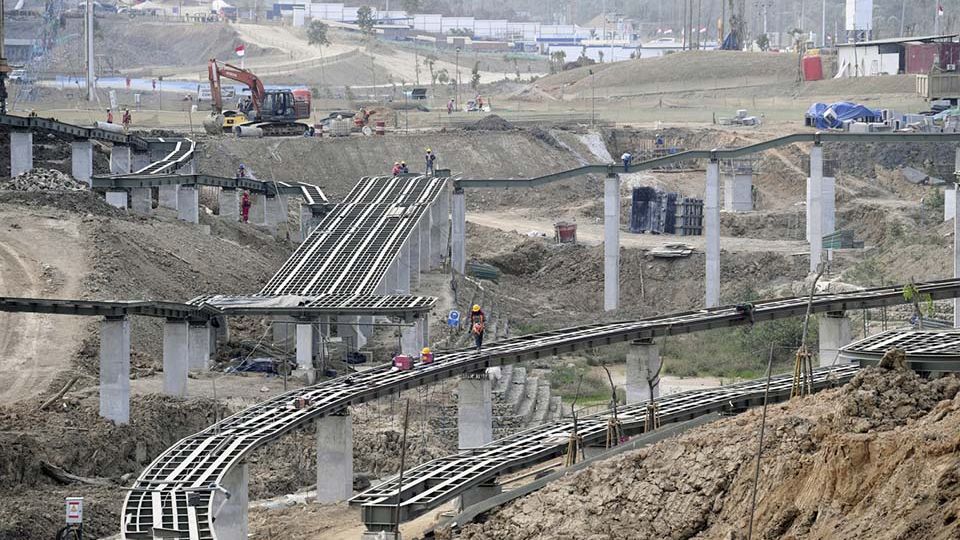June 27, 2024
JAKARTA – Investors have demanded hefty returns in order to get engaged in the future capital city, Nusantara, despite numerous incentives already offered to woo them.
Public Works and Housing Minister Basuki Hadimuljono, who also serves as acting head of the Nusantara Capital City (IKN) Authority, said potential investors typically sought a minimum internal rate of return (IRR) above 12 percent, based on his experience with handling construction projects under his ministry.
In simple terms, the IRR represents the annual profit a project yields for its investors.
“An IRR above 12 percent will definitely be attractive for both foreign and domestic investors,” Basuki said on Friday, as quoted by Bisnis.
The government might need to provide additional support to make construction projects more appealing should the return rate fell below 11 percent, he added, but if the return rate was 12 percent or higher, the project could attract purely foreign direct investment (FDI) without any additional government assistance.
Read also: Developers propose themed districts in Nusantara
The IKN Authority’s special staffer for regional economic area development and peer regions, Rusmin Lawin, said on Monday that an IRR above 11 percent was “attractive enough” for government construction projects.
“An attractive IRR for government projects and public-private partnership (PPP) typically ranges between 12 to 15 percent, while private sector projects typically aim for 15 to 20 percent,” said Rusmin, who also serves as deputy chair for foreign relations at property group Real Estate Indonesia (REI).
Despite numerous incentives already provided by the government, Nusantara has been struggling to garner interest from foreign investors, stoking concerns over its financial feasibility, given that the government wants no more than 20 percent of the overall funding to come from state coffers.
Despite claims that the new city had attracted lots of interest, Investment Minister Bahlil Lahadalia told lawmakers in mid-June that the megaproject had yet to draw foreign investment, which Bahlil blamed on the unfinished core infrastructure.
President Joko “Jokowi” Widodo has urged foreign investors to begin work on projects in July.
The IKN Authority has promised to expedite procedures for foreign investment especially by investors that have shown interest by submitting letters of intent (LOI).
“During my tenure [as acting head, investment has] not yet [come]. Hopefully [this will happen as soon as possible], as Pak President has asked foreign investors to do the groundbreaking in July,” Basuki added.
In a visit to Nusantara earlier this month, Jokowi said the government was finalizing “a big investment” deal with United Arab Emirates-based multinational real estate developer Emaar Properties.
Emaar Properties, renowned for developing the world’s tallest building, the Burj Khalifa in Dubai, plans to construct a 778-meter-tall tower for state-owned enterprises (SOEs) within the second ring of Nusantara.
The Emirati real estate firm also plans to build a business district in collaboration with other property developers.
Density needed
Mamay Sukaesih, a construction, toll road and cement industry analyst at state-owned Bank Mandiri, said on Wednesday that the IRR was crucial for investors to estimate cash flow and profitability, but she added that a high IRR did not always require high public financial support.
As a case in point, she cited toll roads in Java, where a high IRR was driven by a high traffic density rather than by public financing.
“The IRR for Nusantara projects will be influenced by the projected population moving to the future capital,” Mamay explained, as a larger population would create greater demand.
Jakarta-based Institute for Development of Economics and Finance (INDEF) economist Tauhid Ahmad echoed that sentiment, adding that the population density combined with strategic economic functions was essential for boosting the IRR due to the multiplier effect on the local economy.
“So far, the economic multiplier effect is not there [in Nusantara], still consumption. Factors driving consumption are not yet present,” Tauhid told the Post on Wednesday.
Aside from concession periods and available incentives, the IRR remained one of the most important factors for investors to gauge a project’s viability, he said.
“Economic viability will positively affect financial feasibility, but if the economy is not viable, financial feasibility can decline,” he detailed.
The 2023 Nusantara Capital City (IKN) Law allows 95-year land rights for investments made in Nusantara in the form of the right to cultivate (HGU), to be obtained in stages.
Additionally, the government offers nine types of income tax incentives, ranging from tax holidays to a super-deduction of up to 300 percent of costs incurred for development, as stipulated in Finance Ministry Regulation No. 28/2024.
Indonesian Employers Association (Apindo) chairwoman Shinta Kamdani said on Tuesday that the main obstacle to the lucrativeness of investments in the city was its small population, adding that the government needed to address this issue to foster a supportive investment climate.
Read also: Uncertain demand makes investors queasy about new capital city: Apindo
Still reliant on state budget
Until Nusantara reaches sufficient population and economic activity, the construction of the future capital will rely on the state budget to ensure the IRR desired by investors, Tauhid opined.
On the other hand, if government financial support were withdrawn in 2025, coupled with inconsistent infrastructure development and a delayed relocation, a high IRR would not be achieved.
“To achieve higher financial viability or return rate, the state budget must still play a role as a driving economic force until there’s enough economy activity in IKN,” Tauhid pointed out.
Construction in Nusantara has consumed Rp 72 trillion ($4.4 billion) of state funds on building the capital city, Finance Minister Sri Mulyani said in May. This represents 12.1 percent of the total budget allocated for the megaproject, which is estimated to cost Rp 466 trillion in total.
As of May, 45 companies have begun construction on projects in Nusantara, with a combined investment value of Rp 51.3 trillion.


